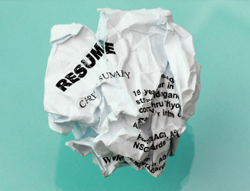Part 1: It’s 2012. Do You Know Where Your Job Is?
21 February 2012

If you’re out of work, and you usually worked in a company tied to the manufacturing industry or related to customer service and call centers, chances are good your job was permanently exported abroad – to Asia to be specific. A variety of factors – some the result of bad U.S. policy and some that are utterly beyond our control- have combined to make it extremely difficult or impossible for low-or-no-skill U.S. workers to compete.
That doesn’t just hurt people manning the looms in South Carolina textile mills and operating stamps in car factories in Detroit. When a factory closes, it lays off a lot more than the blue collar rank and file. The job losses cover the entire socio-economic spectrum. The factory lays off its line assembly workers, its janitors and maintenance workers, its clerical and payroll workers, its engineers and information technology workers, its accounting staff and managers.
It also cuts off the support of the guy who ran the lunch counter across the street, the coffee shop at the end of the block, and the guy who mows the lawn out front and takes care of the grounds.
All those functions are now being done abroad, for a fraction of the price. And even the Chinese are struggling: Emerging manufacturing industries in Viet Nam, Thailand, Malaysia, Pakistan and India are giving even the low-wage Chinese a real run for their money. Why? Their wages are even lower. Chinese policymakers are themselves caught in a squeeze, putting a damper on their economic growth, as Chinese workers are increasingly displaced by lower-wage competitors.
That said, the Obama Administration seems to be doing its level best to make things even worse. Case in point, Obama recently gave a speech at a Boeing plant in Everett, Washington, lauding the benefits of his administration’s economic policy and the gains Boeing made in creating manufacturing jobs from Washington to South Carolina. The irony, of course, is that not too long ago, his unionist Labor Protection Board was trying to strangle the new South Carolina plant in the crib. Meanwhile, his own so-called “jobs czar,” General Electric CEO Jeffrey Immelt, recently shifted GE’s X-ray imaging equipment’s operations to China.
Ford, meanwhile, is in the process of opening three plants in China – and it makes sense, now that China’s rapidly expanding middle class and affluent populations now represent at once the largest and fastest-growing car markets in the world. Henry Ford wanted his own workers to be able to afford Ford cars. Why shouldn’t China experience the same thing?
“Those jobs aren’t coming back,” warned the late Apple CEO, Steve Jobs, at a recent jobs summit, with President Obama in attendance.
The decline in American manufacturing is bigger than Obama – and Obama’s policies are not at the root of the problem. In fact, America has been hemorrhaging manufacturing jobs for a generation. Indeed, the number of manufacturing jobs in the United States – actual, raw numbers – has fallen by some 40 percent since 1979.
Consider this: The largest company in the world, as measured by market capitalization, is now Apple. And Apple, for all its creative energy, is a manufacturer. As of 2011, its global work force was only about 63,000 people: 43,000 in in the United States and 20,000 abroad. In contrast, General Electric, at its peak, employed 400,000 workers: Nearly half a million people – a number larger than the United States Army maintains on active duty.
Wide spectrum of jobs is available at Vitaver’s CAREER section!




